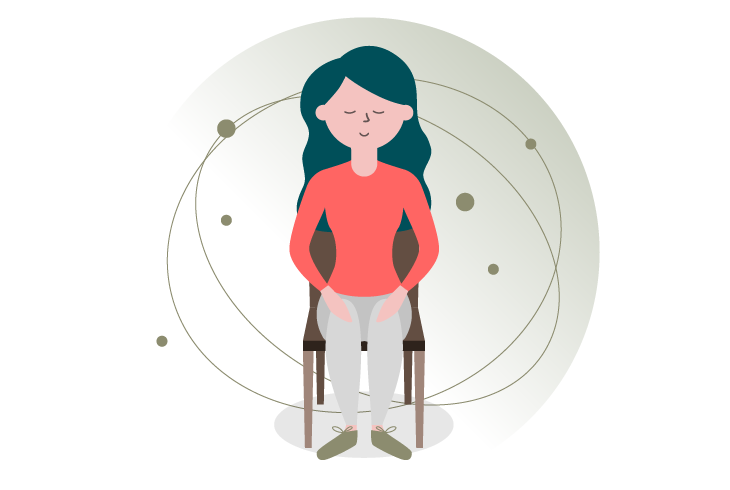I find human beings ability to change and grow fascinating! I became interested in the topic having had my own reserves tested through a particularly challenging time, so I started researching ways in which I could cope better the next time I hit a life roadblock. Inevitability, we all have the odd bad day, but what I am interested in is ones mental attitude to metaphorically dusting ourselves off, getting back up and keeping on going, essentially recognising the incident as a blip, not a constant. This led me to neuro-scientific research on how the wiring in our brains affects our ability to deal with adversity, which is dependent on many variables and impacts on our day to day mental health.
The proof that our brains are capable of repairing (known as neuro-plasticity), enabling us to re-wire our neural pathways or thinking patterns to fortify ourselves in the face of adversity, is such a positive message I am keen to share!”
As corporate life can impose an additional level of stress and pressure on us and in turn, our relationships and day to day living, which can drain our energy and resilience and make life tougher than it should be. Recognising the triggers in advance and learning tips/tools to combat this can be hugely beneficial.
Here we explore more on this important topic, the ways in which our reserves can be challenged and how we can make some lifestyle adjustments to improve our psychological resilience and lead more fulfilling lives.
What is Psychological Resilience?
Psychological Resilience is ones ability to bounce back after a set back or an adverse situation or to put it very simply, to get back up when one stumbles or falls and keep on going. On a word, bouncebackability!
It also links to one’s attitude to life; research has shown that having a positive outlook or disposition can help with building ones psychological resilience.
How might my Resilience be tested?
Modern life places demands on us that can test our reserves - being “always on”, excessive working hours or screen time. Equally, lack of sleep, poor diet and lack of exercise can all contribute to challenging our spirit and energy levels and the knock on affect impacts on our Resilience.
Are there any specific times in life that might impact on our ability to bounce back?
It could be one or any number of things, however times of change or disruption may provide a trigger, e.g. change of career or job, divorce or relationship breakdown, experiencing anxiety and or depression, eating disorders, bereavement, any adverse situation we are struggling with or simply, life!
As we approach Winter, with the limited daylight and decrease in temperature leads to a more sedentary lifestyle where we tend to eat and drink more and typically, exercise less. Whilst there is nothing “wrong” with that per-se, being mindful about having a balanced lifestyle will help to keep energy levels topped up.
What traits do resilient people typically have?
• They have a positive outlook and attitude towards the future
• They do not catastrophise, i.e. they see an adverse incident for what it is, a blip or a one off, not a way of being
• They have solid acheiveable goals and a desire/plan to achieve them
• They celebrate their successes
• They are unafraid of failure, recognising that through failure, we learn (we get back up…)
• They are empathetic and compassionate, however they don’t waste energy worrying about what others think. This is important as is recognising anxious “noise” v what we should be paying attention to
• They maintain healthy, boundaried relationships, they do not bow to peer pressure
• They focus on what they can control and do not see themselves as victims
How can I build my resilience muscle?
The good news is that we all have the ability to develop our Resilience and Reserves! As with tackling any life issue, there is no silver bullet that will “fix”, however adopting a holistic approach will help in abundance. Remembering our mind and body’s are intrinsically connected and therefore looking after one, will in turn, benefit the other.
Some tips for building Psychological Resilience include:
Energy creates energy so think about where you get yours as we are all different. Some tips that have been proven to build our resilience are:
• Move: Do more exercise, if you struggle to do this on your own, find a buddy and commit to certain times to increase motivation. Try different types if you are starting out. In winter, being out in daylight for 40 minutes+ is proven to have positive benefits on our wellbeing. It doesn’t have to be extreme, as long as it gets the endorphins moving and the blood flowing! The ideal would be some cardio mixed with yoga, as long as you feel the benefit.
• Sleep: Getting regular, quality sleep is essential to a healthy outlook. If your sleep is problematic, consider why. Is it the environment, mattress, excessive eating or drinking before bed, or spending too long on screens perhaps - it could be all of the above, by tackling one or all will have pretty instant impact on your sleep. Do not underestimate how lack of sleep impairs our day to day functionality and can make us feel “other”, which is not conducive to a healthy attitude to life.
• Meditation: A personal choice and one I have found useful during particularly stressful periods. There are plenty of app’s to help, many are free. Essentially this encourages a brain reboot and slows down busy minds, temporarily, which can increase energy levels. Research has shown that long term meditation has benefits on a cellular level and combating signs of dementia. However, we recommend you try meditating offline with the help of our Transcendental Meditation teachers.
• Connect: As human beings, we are programmed to connect with others. However in times of stress, we may not feel we have the time or energy to arrange or plan for “fun”. By being around friends and family who appreciate you and just enjoying the connection will have significant benefit on our mental health. Personally, I relate to the old adage of “laughter is the best medicine” - laughter is in addition to a physical release, creates endorphins which lead to a feeling of wellbeing and greater connectivity with those around us.
• Goals: Make plans and goals that reward and give energy, be it physical, educational or something completely different! Consider balance, if your occupation is cerebral, think about something physical or exercise based and if in a more physical job, perhaps an evening class or ways in which to tap into some of the resources you do not use on a day to day basis. This fires up the neural pathways and builds confidence which in turn builds resilience. The important thing is that they should not be arduous or punishing, this is about reinforcing positive and achievable targets.
• Rewards: I cannot stress the importance of recognising your achievements and progress, however small they may seem. By reaching ones goals, and providing a reward structure fires up the neural pathways and builds confidence which builds resilience.
• Supplements: Consider supporting your immune system with acupuncture, supplements, Magnesium Citrate (sleep/mood) Vit D in Winter should the lack of daylight be a thing for you, as it is for me. Everyone needs additional support at different times of life so explore what gives you a boost.
• Therapy: It might be helpful to seek professional support during acutely testing times. This can be particularly helpful in developing your own resilience tool-kit to combat and deal with your own needs.
• Kindness: Simple mantra to live by, be kind to yourself and others! In giving, may we recieve.

 CORINNE GUION
CORINNE GUION
 30 October 2023
30 October 2023